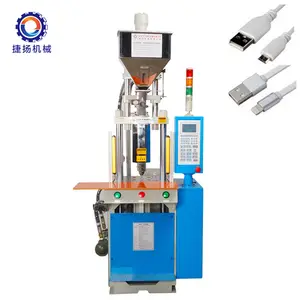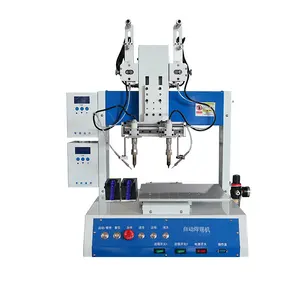
All categories
Featured selections
Trade Assurance
Buyer Central
Help Center
Get the app
Become a supplier

(1980 products available)

























Mobile data cable machinery can serve various functions and, in turn, can be molded into various forms. The following part highlights the leading varieties of equipment used for the organization and creation of data cables.
One of the revolutionary cable-cutting machines is the automatic cable cutters. Hence, these machines can achieve precise cuts to edit the material. Precise cutting reduces wastage and incompetence during the editing stages. Most cable cutters can adjust settings to reduce operation time when styling cables of different lengths.
Mobile data cables require insulation to be stripped off their conductors. Thus, cable stripping machines can remove insulation layers without damaging conductors. This feature increases the quality of prepared cables. Automated stripping machines increase production speed while maintaining accuracy compared to manual devices.
Crimping is the act of attaching connectors to the ends of cables. Crimping machines perform this function with precision and uniformity. These machines ensure tight fits between conductors and connectors, improving signal transmission. Automated crimpers can handle multiple connector types and reduce manual labor with efficiency in production.
After preparing the cables, testing is necessary to guarantee their performance. Cable testers check for continuity, signal loss, and other vital attributes. Testing equipment is important for detecting defects early. Thus, this equipment improves quality assurance. Advanced testers can perform several evaluations simultaneously and decrease the time for testing many cables.
Mobile data cable machinery is made from various elements to meet structural, operational, and durability demands. This part discusses the materials commonly used in cable machinery.
Generally speaking, steel tends to be at the core of any structure that requires toughness. Steel is applied in constructing frames, blades, and critical components of cutting and crimping equipment. Steel's tensile strength enables it to handle the pressure seen during several operations without collapsing or producing several mistaken results.
On the other hand, aluminum is lightweight. It is used in parts where mobility is crucial, such as portable crimping machines. In addition, aluminum has resistance to corrosion, even in humid or oily areas. This trait extends to a substantial part of the machinery's life, especially in outdoor or field activities.
Cable stripping machines require blades that maintain sharpness for extended periods. This need is satisfied by ceramic blades, which have excellent wear resistance. Hence, in tune with this, these blades will ensure that the machine will function effectively. Moreover, cable strippers will not develop numerous defects due to the diminished chance of blade degradation.
Lastly, plastics feature within the machinery. Plastics are present in non-load-bearing areas and insulating components in electric parts. This material offers electrical insulation and is resistant to corrosion. Nonetheless, this quality ensures the safe and effective functioning of equipment containing many electrical components.
When considering mobile data cable machinery, the commercial prospects become quite appealing. Improved efficiency, cost savings, and enhanced product quality all denote the benefits of investing in advanced cable machinery. Closely looking at these advantages underscores the strategic gains for businesses operating in the data transmission market.
Mobile data cable equipment automates most cable preparation and installation tasks. Thus, this equipment cuts, strips, crimps, and tests cables for a speedy process. In most instances, automating these activities removes the need for manual labor. Consequently, it enables workers to focus attention on other critical tasks that will eventually enhance overall production capacity.
Furthermore, the accuracy of the machines stated here reduces mistakes. Inaccuracies can lengthen processes and increase overheads. The implication of this is that cables produced with high precision can lead to a reduction in the wastage of materials during processing in addition to usage.
Even though the initial cost of the machinery can be high, the long-term recovery of costs is still achievable. The foremost factor is the reduction in labor costs. With mechanization, fewer employees are required to make mobile data cables. Hence, overhead expenditures are reduced significantly.
Moreover, efficient cable preparation lowers material wastage. Less wastage means less money spent on raw materials. Another aspect is that if the cables are installed properly, there will be no need for rework or replacement, saving time and material costs.
These machines mentioned earlier enhance the product's overall quality as they perform the operations needed to produce better cables. As seen, precise cutting and crimping lead to fewer defective products. Mobile data cable crimping can enhance signal quality and data transmission performance.
The testing equipment identifies defects early in production. Consequently, this capacity for early detection minimizes the risk of selling subpar products. Ultimately, improved quality enhances customer satisfaction. Therefore, this can lead to a loyal customer base and better market reputation.
Selecting mobile data cable machinery requires businesses to consider several important factors. The following part outlines the key considerations that will help guide this decision-making process.
In most cases, the versatility of the machine tends to be crucial. A solitary piece of machinery for cutting, stripping, and crimping is sufficient. This type of all-in-one machine can boost productivity. However, dedicated machines for various functions can also be efficient. Nonetheless, versatility depends on the specific needs and the demands of the operation.
The speed of the machine correlates with how fast it can cut or strip or crimp cables. A machine with higher throughput will be very effective for large production. This situation will eliminate any backlog of processing. However, for smaller activities, machines with lower speeds may still be adequate.
Budget is also a critical consideration. The costs of machines vary significantly. For this reason, it is essential to assess what a company requires and its purpose. If the company's needs are big, it might need to invest in high-capacity, expensive machines. However, for low activities, affordable machines may cater to the needs without breaking the bank budget-wise.
Machine operation complexity can affect the efficiency of mobile data cable production. Machines with user-friendly interfaces and simple setup processes require less time to train the staff. Thus, this consideration is vital for ensuring smooth operations. Complicated technology may reduce efficiency due to the long training times required for the employees.
After-sales support also needs to be factored in when purchasing mobile data cable machinery. This machinery will have to be serviced and repaired at some point. Manufacturers who offer a good warranty and further support might be the best option when considering future maintenance.
A1: Machines for cutting cables can be used on various cable types. However, these cable-cutting machines are mainly made for mobile data cables.
A2: Mobile data cable machines only require routine maintenance, such as lubricating parts, cleaning them, and checking them for wear and tear. However, it is crucial to refer to each machine's maintenance manual.
A3: Testing equipment should frequently be calibrated to guarantee correct readings. Nonetheless, it is advised that calibration take place at least once every six months or when there are major changes in production.
A4: Yes, several machines are normally available for high-volume production. They are automated to increase the production rate of crimping, cutting, or stripping.
A5: Machine precision directly affects cable quality since high precision results in low defects and correct installations. Consequently, this leads to better cable performance in data transmission.